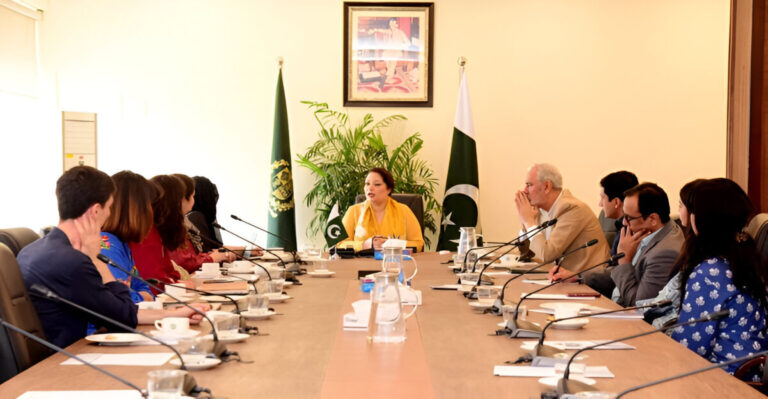Islamabad, Aug 29: To discuss the urgent problem of climate change and its effects on Pakistan, a four-person delegation of Milan University students in Italy paid a visit to Romina Khurshid Alam, Coordinator to the Prime Minister on Climate Change.
The students’ delegation was also informed of the various socio-economic effects of climate change and the government’s policy measures for enhancing the nation’s climate resilience during the meeting held here on Thursday in the ministry of climate change and environmental delegation, according to a news release.
“As we all know, climate change is one of the most critical challenges facing our world today, and its effects are increasingly evident in Pakistan,” the PM’s climate aide remarked while welcoming the delegation of students on this special occasion.
Romina Khurshid Alam informed the students that Pakistan, which is among the top ten countries in the world that are most vulnerable to climate change, has been seeing an increase in the frequency and severity of extreme weather events, especially unprecedented floods, strong monsoon rains, intense and destructive heatwaves, rapid melting of glaciers, and the ensuing floods caused by glacial lake outbursts.
She emphasized how the recent heatwave in June 2024 caused temperatures to reach to record highs, having an effect on agriculture and public health. “Floods, which are becoming more intense and frequent, disrupt livelihoods, damage infrastructure, and uproot thousands of families, especially in rural areas,” the speaker continued.
“Managing these climate change fallouts has become a grave challenge for resource-poor country due to insufficient financial and technical resources as well as the frequency and magnitude at which they are occurring.”
The community that depends on the resources for its livelihoods and environmental protection depends on important ecosystems like mangroves and wetlands, and these habitats’ health and biodiversity have changed as a result of climate change.
The current administration was putting different adaptation plans into practice, such as enhanced water resource management, early warning systems, and flood control projects. Initiatives are also being launched to support sustainable land use and climate-resilient agriculture.
She provided specifics about the government’s coping strategy, stating that in order to address these climate risks and increase the resilience of the population, their means of subsistence, ecosystems, and public infrastructure to climate change, the current government was putting various adaptation strategies into practice, such as enhanced water resource management, flood management projects, enhanced early warning system network nationwide for better and more accurate weather and disaster forecasting, as well as better management of water resources.
In order to increase the climate resilience of the agriculture sector, there have also been programs to support sustainable land use practices and climate-resilient agriculture. She gave an update on the steps taken by the Ministry of Climate Change and Environmental Coordination to get funds for the implementation of various strategies for resilience-building and adaptation.
“The ministry is collaborating with donors and international organizations to get financial support and technical help for projects aimed at mitigating and adapting to climate change. The UN and other environmental NGOs are working together as part of the efforts to address the short- and long-term effects of climate change, she said.
Speaking about community awareness and participation in government-run climate risk mitigation programs, Romina Khurshid stated that grassroots organizations focusing on disaster preparedness, reforestation, and sustainable farming methods were bringing local communities closer to climate action. The PM’s climate assistant also mentioned that periodic education and awareness programs were carried out through the media, schools, and other channels to enlighten and empower people to take climate action.
Romina Khurshid Alam emphasized that the most serious global concern of the twenty-first century was climate change, which called for international cooperation. But Pakistan would, being a responsible nation, keep working with international partners to advance climate action by putting the climate initiatives into effect, promoting equitable and successful climate action on a global scale.
The students expressed their gratitude to Romina Khurshid, the PM’s climate aide, and her team for an insightful briefing regarding the country’s climate dangers and the steps being taken by the current government to make Pakistan climate resilient.They noted that Pakistan set a fantastic example for other nations to follow with its commitment to global climate action.



